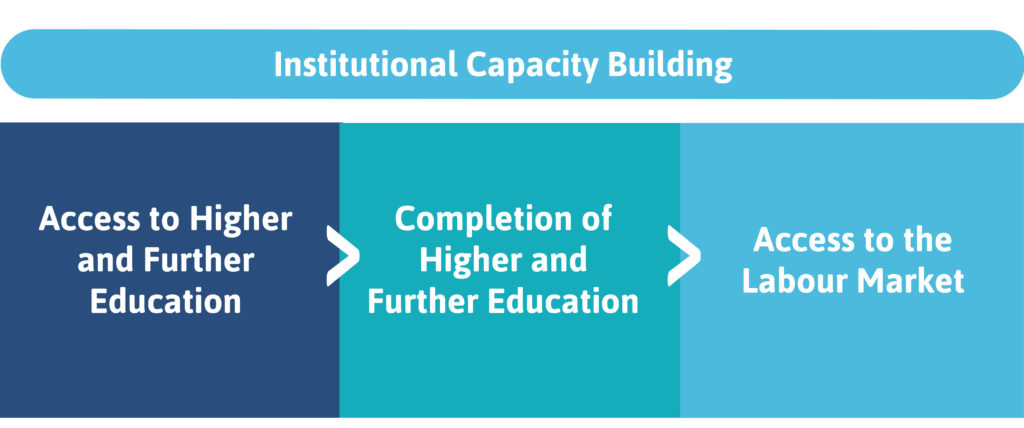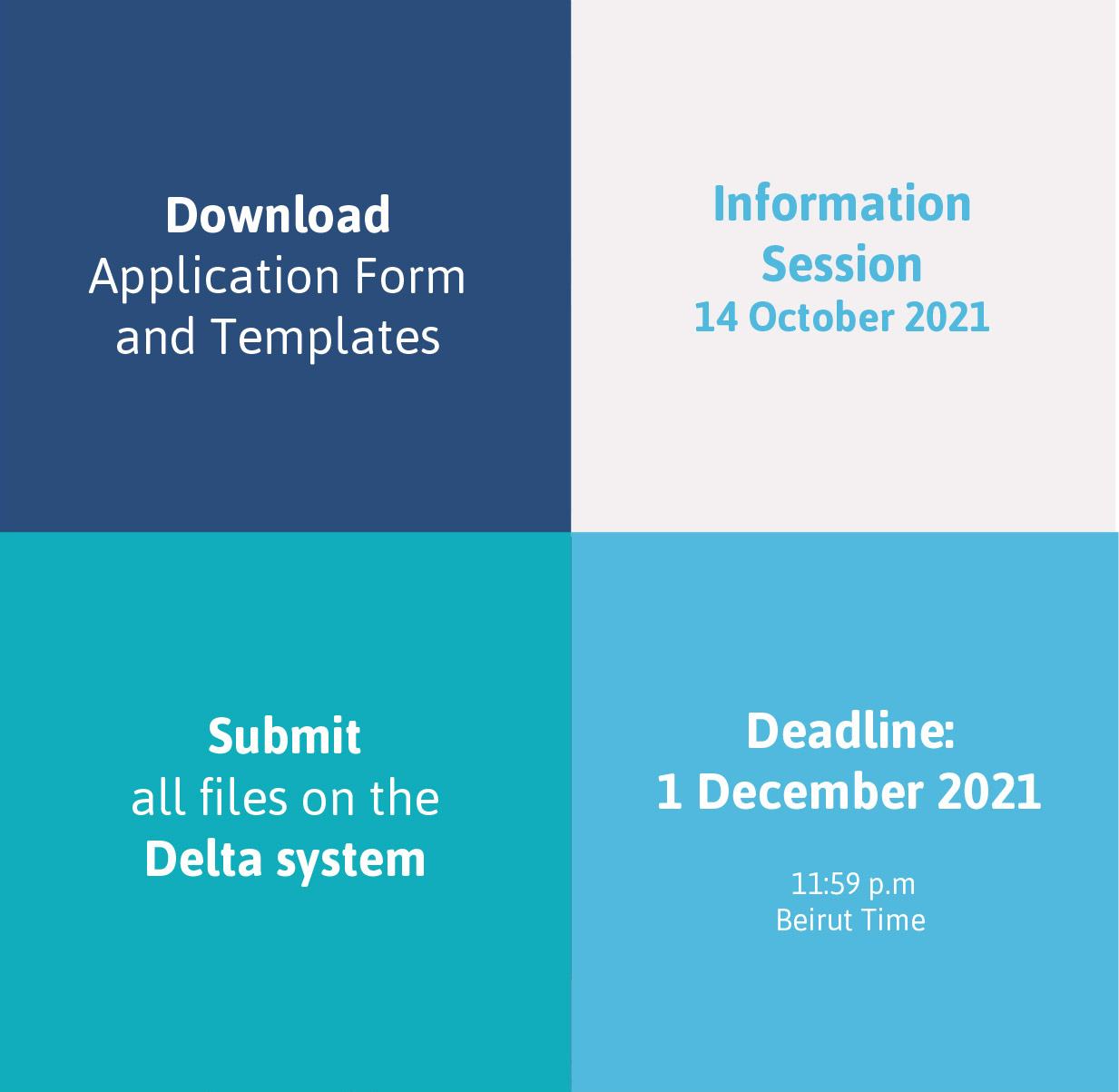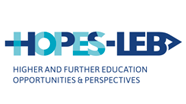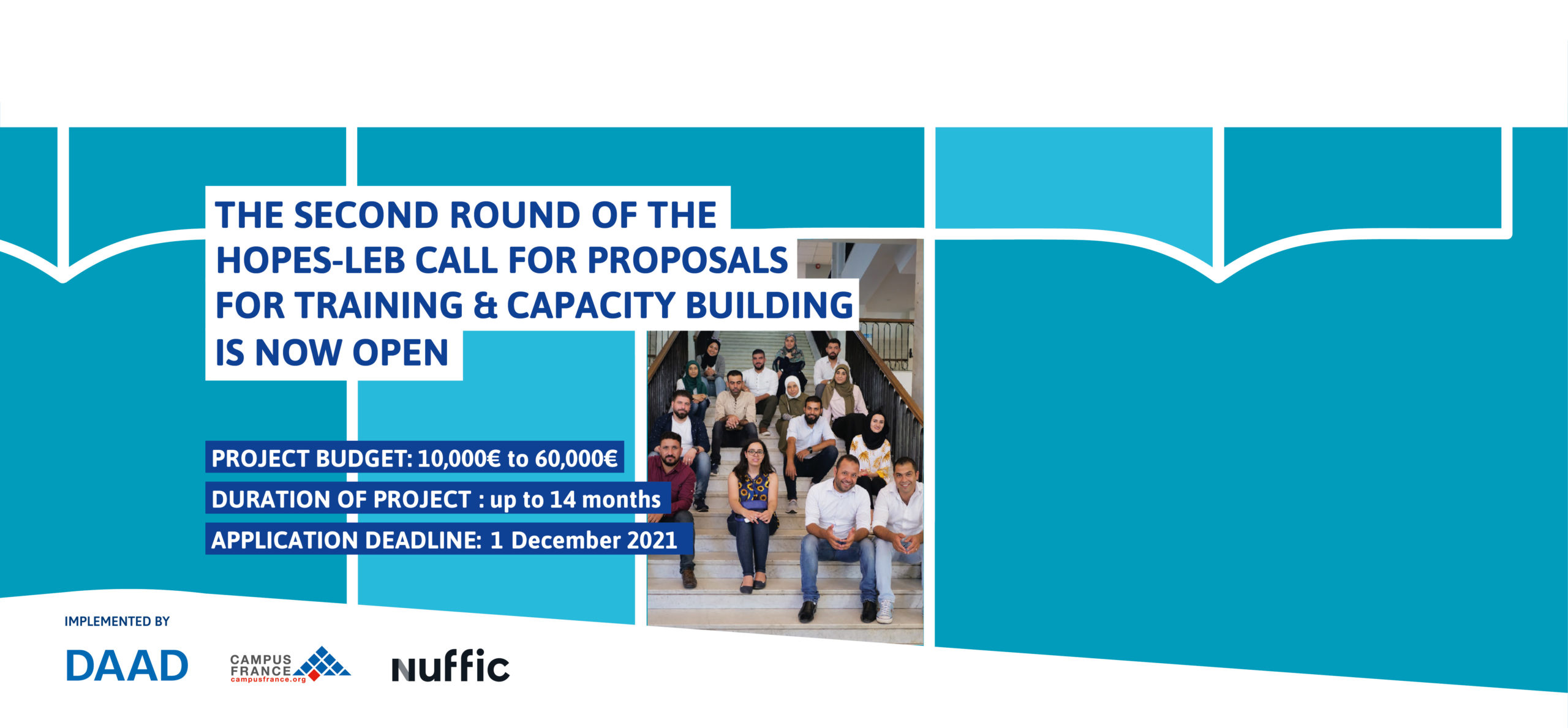The Second Round of the HOPES-LEB Call for Proposals to support Training and Capacity building projects
Funded by the European Union in Lebanon
The project HOPES-LEB (Higher and Further Education Opportunities and Perspectives for Syrians and vulnerable youth in Lebanon), funded by the European Union through the EU Regional Trust Fund in response to the Syrian Crisis, the ‘EU Madad Fund’, and implemented by the German Academic Exchange Service (DAAD), Campus France and Nuffic, is pleased to announce the opening of the second round of the HOPES-LEB Call for Proposals to support short-term training and capacity building projects implemented by local institutions and organisations registered in Lebanon.
HOPES-LEB aims at improving livelihood prospects through higher education opportunities for vulnerable Lebanese youth and refugees from Syria, increasing their chances for a better future. The project follows a comprehensive approach covering the entire educational pathway for higher and further education, from preparation for and completion of higher and further education to access to the labour market through the provision of academic scholarships, and counselling, funding for innovative short-term education projects implemented by local institutions, stakeholder coordination and the development of a unified regional alumni network together with other higher education projects in the region.
More about HOPES-LEBFunding for Training and Capacity Building
Through the second round of the HOPES-LEB Call for Proposals, the HOPES-LEB project invites organisations and institutions registered in Lebanon to submit tailor-made project proposals that address the specific needs of vulnerable Lebanese youth and refugees from Syria and alleviate bottlenecks related to access to and completion of higher and further education and labour market integration.
Through the Funding for Training and Capacity Building, a total of €1,080,000 is available to support projects in Lebanon, which allows for at least 18 projects in total
During the first round of the Call for Proposals, nine projects were selected for funding and started implementation.
The second round of the Call for Proposals aims to support at least nine additional projects ranging from €10,000 to €60,000.
Discover the projectsThe type of projects envisioned for the selection are expected to focus on institutional capacity building rather than on the development of individual skills of the target group and address one or more of the priority areas of the educational pathway as described below to provide better services for vulnerable Lebanese youth and refugees from Syria.
This includes facilitating the transition from secondary to higher and further education, limiting the risk of drop-out for students enrolled in higher and further education, and facilitating the transition from higher and further education to the labour market.
Beneficiaries are defined as follows:
- Direct beneficiaries: individuals that are the first-hand targets of the interventions and activities of a project;
- Indirect beneficiaries: individuals which have no direct link with the activities but could potentially benefit from them via the direct beneficiaries and the sustainability of projects’ results, mainly achieved through capacity building measures.
As part of the assessment criteria for the Call for Proposals, all proposals should demonstrate how institutional capacity building will be embedded in the projects in addition to ensuring coverage of one or more priority areas of the educational pathway.
Proposals are requested to address the direct needs of organisations and higher and further education institutions with the aim of enacting and promoting sustainable change. Requesting organisations can focus on several institutional capacity building themes to become more effective in targeting the specific needs of the target population.
In line with the three priority areas identified by HOPES-LEB, applicants are strongly encouraged to focus on one or more of the below themes while ensuring that direct beneficiaries will benefit from the chosen theme(s). These themes have been identified based on the findings of the HOPES-LEB Call for Proposals Stakeholders Survey in addition to insights gathered through discussions with different stakeholders in the education and livelihood sectors:

- Developing an orientation tool for students in secondary education to choose the right study programme based on their interests and personal competencies and disseminating them across and within organisations/ institutions
- Developing innovative solutions for e-counselling centres with adequate resources to enhance students’ recruitment and reduce drop-out and disseminating them across and within organisations/institutions
- Developing the capacity of local institutions to deliver quality language training and preparatory courses to students
- Modernising higher education systems including updating/developing curricula
- Designing tailored psychosocial support strategies and developing staff’s capacity to effectively address social inclusion, trauma management, and gender issues among students
- Strengthening the soft skills and technical competencies of staff while creating new mechanisms to maintain talent and reduce turnover and dropout rates
- Developing dynamic career centres to advance students’ employability prospects and entrepreneurial skills
- Promoting employment of beneficiaries in the agri-food industry, ICT sector, and other on-demand sectors
- Organising networking activities and establishing job offering databases
- Facilitating physical and virtual internships and traineeships as alternative learning and employment opportunities in line with the underlying challenges
- Developing and implementing institution-level strategies to foster innovation ecosystems and build a green economy by improving students’ innovative competencies

General Information
- All projects can request funds for their actions ranging from €10,000 to €60,000.
- The maximum duration of these funded projects should not exceed 14 months.
- The amount granted will be based on the budget and the cost breakdown within the application as long as this is in line with the eligible cost criteria as specified in the ‘Rules and Regulations’.
- Applicants are requested to submit their budgets in EUR and are required where possible to submit their receipts and supporting documents in EUR or USD. Applicants are also requested to clearly indicate in the Budget Justification column in the budget template which costs cannot be declared in EUR or USD and for what reason.
- All proposals will receive 40% funding at the start of the project and 40% halfway. The final payment will be 20% of the requested amount.
- Implementing partners are all requested to submit an interim report halfway through the project and a final report after the project has ended. Second and third payments will be linked to the interim and final report, respectively. Additionally, partners with projects with a duration of more than six months are requested to submit quarterly reports every three months of the project. All reports include both narrative and financial reporting based on the templates provided by HOPES-LEB.
- Monitoring visits will be conducted by HOPES-LEB project team during which the progress of projects will be assessed.
- Awarded projects will receive the first payment after signing the contract, upon which projects are supposed to start as soon as possible.
- One organisation can submit several proposals and can participate in proposals submitted by other entities as co-applicants. However, during the same round of Call for Proposals, only one application should come from the same administrative unit. It is not allowed to submit proposals with more or less similar content even if submitted from different units.
General Eligibility
The general criteria that proposals under the Funding for Training and Capacity Building have to comply with in order to be eligible:
- Proposals should come from organisations and institutions officially registered in Lebanon
- (Co-)Applicants must be:
- Local ministries and governmental organisations
- Youth or labour organisations
- NGO’s (local, regional and/or global)
- Education and research institutions (local, regional and/or global)
- International NGO’s, regional and global research institutes and regional and global education institutions can participate as co-applicants in a project, in which a Lebanese registered entity takes the lead.
- (Co-)Applications from research institutes and education institutions: this type of institutional cooperation has to be practical and demand-driven and should arise from the needs of local organisations.
Selection and Award Criteria
The projects must take place in Lebanon and be demand driven and tailored to the needs of the requesting organisation and target group. Projects will be assessed based on the following general selection criteria:
- Address one or more of the priority areas of the educational pathway, i.e. to support access to higher and further education, completion of higher and further education, and access to the labour market for refugees from Syria and/or vulnerable Lebanese youth
- Respond to a high need for institutional capacity development which in the context of this call is defined as “the improvement of an organisation’s/institution’s capabilities to deliver its mission effectively and efficiently and create sustained change by strengthening managerial systems, human capital, infrastructure, legal frameworks, and core support functions”
- Demonstrate the link to needs following the current context in Lebanon (among others, the COVID-19 pandemic and the economic/ financial and social crises)
- Provide access to resources and effective solutions to organisations, institutions, and/or other targeted beneficiaries
- Ensure synergies, complementarity and coordination between existing capacity building projects
- Deliver tangible results and clear outputs
- Include relevant partners and strengthen partnerships between higher education, the livelihoods sector, and community-based organisations where possible
- Promote the achievement of gender equality and pay particular attention to the specific needs of youth with disabilities. Indicators should inform on the ratio of refugees from Syria/ vulnerable Lebanese
- Have an effect also after project completion (sustainability) by focusing on institutional capacity building and not only capacity building of staff and targeted beneficiaries, in addition to ensuring an impact on indirect beneficiaries
- Requested budget should be consistent with the project action plan and in line with HOPES-LEB financial regulations
The proposals will be assessed on the following criteria leading to a maximum score of 100 (See the Selection Score Sheet Application below).
The Process
Opening of the Call and Application Procedures
The second round of applying for the Call for Proposals will be from 14 September, 2021 until 01 December, 2021.
Institutions have to apply for the call by downloading the necessary application form and documents and submitting them online through the Delta system.
Applicants are requested to upload all documents and submit their applications before 11:59 pm (Beirut Time) on 01 December, 2021.
- The Delta system will close at that time and will not allow any submission after 11:59 pm.
- No applications will be accepted after the closing time via e-mail.
- Incomplete submissions will not be taken into consideration.

Information Session
During the application period, an information session was organised on 14 October 2021.
It included a presentation of the Call for proposals highlighting the most relevant information (what is the purpose of the Funding for Training and Capacity Building, what kind of projects are eligible, who can apply, reporting requirements, etc.).
Interested applicants had the opportunity to ask questions and get clarifications where needed. The information session was recorded and based on the questions received during the session and through other channels, a Q&A sheet was published answering to the most frequently asked questions.
To access the recording, power point presentation and Q&A please check the dedicated info session page
Selection Process
Following the closing of the call, the HOPES-LEB team will screen the proposals to ensure the completeness of documents and will conduct an eligibility check based on the eligibility criteria.
After the initial screening process, the HOPES-LEB team will conduct a first evaluation of the proposals and shortlist proposals to be evaluated by the Selection Committee.
HOPES-LEB will invite representatives from the higher and further education and the livelihoods sectors to take part in the selection committee that will assess shortlisted proposals and recommend projects for funding. The committee will base its decision on the criteria fixed in a specific score sheet which are derived from the general criteria mentioned above.
The HOPES-LEB team will then select the projects to be funded based on the recommendations of the Selection Committee and inform applicants of the final decision.
Implementation
Awarded projects will be notified as soon as the HOPES-LEB team has finished the selection process.
Selected organisations will be requested to complete and submit additional financial documents including a bank statement, a financial identification form, and a certificate of legal registration.
The first payment will be initiated upon delivery of all required documents and the signing of an agreement between the organisation and Nuffic as the Contracting Authority.
Assigned organisations and institutions are expected to start implementation as soon as funds are received.
Reporting Requirements
The maximum duration of a project will be 14 months. All projects are requested to submit an interim report halfway through the project and a final report after the project has ended.
After a first payment at project start, second and third payments will be based on the interim and final reports respectively. The dates for the interim and final reports will depend on the length of the project.
Partners of projects with a duration of more than six months are requested to submit quarterly reports. The quarterly report can be replaced by the interim report depending on the length of the project and where applicable.
To provide clarity on the project-specific reporting requirements (and corresponding deadlines), these details will be communicated to the project partners by the HOPES-LEB team.
Payment in Tranches
All proposals will receive 40% funding at the start of the project and maximum 40% halfway after the submission and approval of the interim report (second payment amount will be set as the amount calculated on the basis 40% of the project budget amount less the unused balance of the first payment).
The final payment will be maximum 20% of the requested amount due after the submission and approval of the final report. If the budget is not 100% depleted at project end, the final payment will logically not amount to payment of 100% of the originally proposed budget. Furthermore, payments will only cover eligible costs (please check the ‘Rules and Regulations’ for projects funded by HOPES-LEB).
Monitoring Visits
Based on the interim reports, monitoring visits will be conducted by HOPES-LEB project team. During these visits, their progress will be assessed.
Required Documents
All applicants must complete the following documents:
- Full Application Form
- The form should include annexes 1, 2, 3, and 4
- Application form to be completed and submitted by the requesting organisation only
- Checklist for Organisational Capacity Assessment COCA
- The Checklist includes annexes 1 and 2 (to be merged and uploaded as one document)
- Budget Template
- excel form to be downloaded, completed and submitted
» All documents should be submitted in English.
» Official documents can be submitted in Arabic along with an official translation into English.
» All documents should be uploaded as PDF to the Delta system as follows:
Guidelines Documents
The Guidelines for this Call for Proposals and the applied procedures are explained in the following table.
Please read all documents carefully before filling in the application form.
- Rules and Regulations for projects funded by HOPES-LEB
- Selection Score Sheet Application, as used by the selection committee in its assessment of proposals
Communication and visibility
Please note that if selected, applicants are required to abide by specific communication and visibility guidelines developed for the implementing organisations and to provide a full communication and visibility plan.
Application Process

For more information:
For further inquiries about the HOPES-LEB Call for Proposals, please contact us by
- E-mail: cfp@hopes-madad.org
Learn more about the support of the EU Regional Trust Fund in response to the Syrian crisis, the EU Madad Fund:
The European Union strongly believes in investing in higher education, as an asset for the future of individuals and societies as a whole, especially in recovery and peacebuilding post-conflict processes. Young Lebanese and Syrians having sought refuge in Lebanon face a combination of hardships hindering their access to higher and further education. For this reason, the European Union has donated more than €70 million to provide young Syrians and disadvantaged youth from Iraq, Jordan, Lebanon, and Turkey with opportunities for higher and further education since 2015. More than 6000 youths, of whom 46% are women, benefit from this support, provided through the EU Regional Trust Fund in response to the Syrian crisis, the EU Madad Fund. More than 1500 Higher Education certificates have already been awarded to young graduates, with many more to come in the upcoming years.
Thanks to European Union support, the HOPES-LEB project will contribute to increase the number of young people, both refugee youths and host communities in Lebanon, being able to get a higher education and to improving their employment prospects. This will offer them better prospects for their future no matter where they are. In the context of the particularly difficult economic situation and the challenges experienced by many higher education institutions, this programme will contribute to alleviate the negative impact on the sector.





